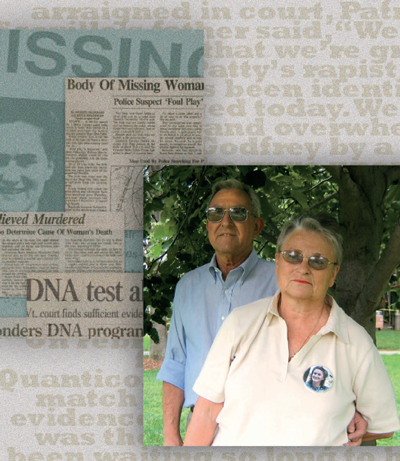After two decades, David and Ann Scoville finally bring their daughter's killer to justice
After two decades, David and Ann Scoville finally bring their daughter's killer to justice
When David Scoville '61 and Ann Vanorder Scoville '61 watched their daughter, Patricia, graduate from Cornell in 1986, they were thrilled. Their class years were exactly twenty-five years apart, so no matter where they were in life, they could all count on getting together in Ithaca every five years.
This June marks David and Ann's 50th Reunion. Patty— who, like her mother, majored in human development and family studies in the College of Human Ecology—would have celebrated her twenty-fifth. But this spring the Scovilles will again go to Ithaca without their daughter: she was raped and murdered in the woods outside Stowe, Vermont, in October 1991, at age twenty-eight. Patty's death changed her parents' lives forever, launching the couple on a thirteen-year search for her murderer and transforming them into dogged advocates for the reform of DNA profiling legislation. Now that their daughter's killer has been sentenced, that journey has finally ended; this June, David says, "we want people to know it's over."

As recounted in a CAM feature in July/August 2006, the killing of Patty Scoville became a case study in the power and limitations of forensic DNA evidence. Eight days after her murder, searchers discovered Patty's body, which had been buried in a shallow grave. Investigators collected a semen sample from her clothing and isolated a distinctive DNA "fingerprint" that pointed to the unknown assailant. But at that time, Vermont was one of two states that lacked a forensic database of DNA drawn from crime scenes and convicted offenders, and police were unable find a match among the more than a hundred suspects who, through both consent and court order, donated samples to investigators.
For years, the case languished. But Ann, a retired Girl Scout Council field team manager, and David, a retired language arts teacher, traveled to Vermont from their home in Canandaigua, New York, every October—an annual pilgrimage to keep Patty's story in the public eye and remind investigators that they weren't giving up. After five years of frustration, they turned their energies to advocacy, writing letters and testifying in support of expanding the use of DNA evidence. The goal: urge Vermont lawmakers to establish a DNA databank for convicted offenders and join the national Combined DNA Index System (CODIS), a network of DNA databases that allows investigators to share genetic evidence among jurisdictions.
The use of these forensic DNA libraries was—and remains—controversial, with civil libertarians expressing concerns about privacy, misuse of genetic information, and the possible deepening of racial disparities in criminal justice. But the Scovilles— soft-spoken but tenacious—were instrumental in the 1998 passage of a bill that gave Vermont access to CODIS. The bill also established the state's own DNA database for violent offenders— a library of genetic profiles that, in March 2005, finally yielded a match for the sample found on Patty.
The arrest of that suspect, a fifty-eight-year-old contractor named Howard Godfrey, finally brought the Scovilles a measure of justice. It would take another three years for Godfrey's trial, which David and Ann attended. "It was difficult to hear the details," Ann recalls. "But I pulled up my strength and said, 'I'm going to be there, because I want you to see me.'" It took a jury less than two hours to convict Godfrey, who was sentenced to life without parole in 2008. "That was what we were after," David Scoville says. "We felt comfortable knowing he was going to be put away, and he's never going to get out."
The trial and sentencing brought the Scovilles a fresh round of publicity, including stories in the New York Times and a segment on CBS's "48 Hours." It also brought another milestone in their daughter's case: the day before Godfrey's sentencing, Vermont dedicated its forensic DNA lab in Patty's name. Last October, the Patricia Scoville Memorial CODIS Laboratory moved to its new home in a state-of-the-art forensic facility in Waterbury. "That was a really positive note to finish on," Ann says. "To say, 'There—there's a tribute to Patty.' It helped us withdraw a little, bit by little bit. You hear people talk about 'closure.' I wouldn't call it closure. But it does bring it to a kind of end."
Now the couple are unofficially winding up their advocacy efforts, though they still make occasional appearances in support of expanding DNA legislation in other states. "We've gone back to being retired people," David says with a chuckle. It's a welcome transition, but a slow one. "All that time we waited and waited tempered us a little bit," David adds. "You see people whose kids get murdered, they get so angry at the whole world. Somehow, we were able to get over that." Says Ann: "Time is a gift."
David describes sitting in the Vermont statehouse on the day of the lab dedication, knowing that his daughter's killer was in a cell not far away, and that he would never again be a free man. The feeling, he says, was simple: relief. "We set out to do something," he says. "And we got it done."
— David Dudley


